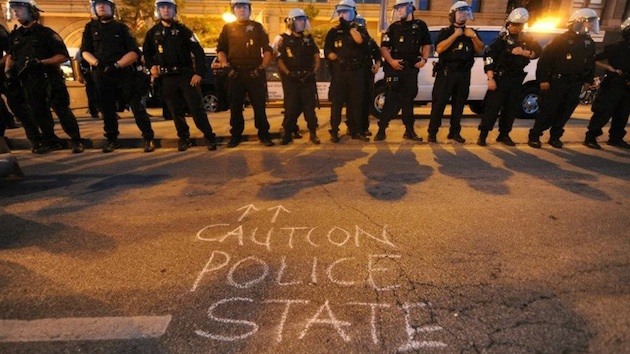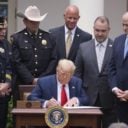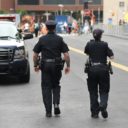

Police officers in partial riot gear stand in protection of businesses during protests over the grand jury’s decision not to indict Officer Darren Wilson.
Americans overwhelmingly say that their local police are their protectors and give a high favorability rating in appreciation of the job they do on a daily basis. Most also believe deaths that involve policemen are usually the fault of the suspect, not the cop.
A new Rasmussen Reports survey finds that 67 percent of American adults rate the performance of the police in their region or community as “good” or “excellent,” while just 9 percent say they are doing a “poor” job.
The survey of 1,000 American adults that was conducted on December 4-5, 2014 and had a margin of error of +/- 3 percentage points with a 95 percent level of confidence, also mirrored a conclusion found by Gallup.
A recent survey by Gallup found that region — and surprisingly, to a lesser extent race — has an enormous impact on the respondent’s answer. For instance, Gallup found that blacks living in urban areas are significantly less likely than blacks in non-urban areas to say they are confident in the police.
On average, 57 percent of Americans have said they have “a great deal” or “quite a lot” of confidence in the police, which places the police at the top of the confidence in major U.S. institutions list. This includes confidence ratings of 61 percent among whites, 57 percent among Hispanics, and 34 percent among blacks. However, while 26 percent of blacks living in inner-cities have confidence in the police, nearly 40 percent say the same in rural America. Unfortunately, one in three blacks nationwide live in these highly urban, extremely dangerous urban counties.
Unlike the Rasmussen survey, however, which asked specifically about performance standards, the confidence measurement in Gallup’s poll also includes various other responses. For example, it may be that the respondents believe the police need to increase their presence in dangerous inner-city neighborhoods, not just decrease the presence because of some injustice.
When Gallup poses questions regarding injustices, the trend line is disturbing. What is disturbing is that the statistics do not seem to back up the increased outrage over policing, which suggests the grievance industry is responsible for a large part of the sentiment. Those who organized the anti-police protests in Ferguson and nationwide have used the mantra that black men are under assault in America, are valued less than white lives, and tweet out #BlackLivesMatter to incite anger and garner support.
It appears to be working, for example.
Younger black males are more likely than older black men or black women to report having been treated unfairly by police within the past 30 days, which is the highest level of perceived unfair treatment among young black men out of five situations measured. Yet, according to the Department of Justice, over the past 50 years the rate of black Americans killed by police has actually dropped by a whopping 70 percent, despite their disproportionate responsibility for violent crime.
In 2013, blacks comprised 13 percent of the population and committed 5,375 murders in America, while whites comprised 63 percent of the population and committed 4,396. Still, out of the more than 43 million blacks living in the U.S., just 123 were shot dead by police, compared to nearly triple that number for whites.
Meanwhile, there are about 670,000 law enforcement officers currently serving in America, yet according to the FBI, nearly 50,000 police officers were assaulted in 2013. Further, 76 cops died on the job.
So, despite policing of black communities and crime improving significantly, young black males seem to feel they have a harder time than men who remember Jim Crowe. That doesn’t make sense unless we factor in Al Sharpton, Jesse Jackson and, to a lesser extend, Attorney General Eric Holder and President Barack Obama.
Holder recent announced the Justice Department will implement new rules that expand current bans on profiling by federal law enforcement, but Americans are less convinced of the need for him to do so. Racial profiling, according to another survey, is used less and needed less as a police tool.
Rasmussen Reports found that 35 percent of American adults believe factors such as race, ethnicity and overall appearance should be used by police officers to determine whom they should randomly search. However, 46 percent disagree with this type of profiling and 19 percent are undecided.
Despite all of this improvement in society, Americans still believe race relations have worsened under President Obama’s six-year tenure, which is undoubtedly one of the biggest failures of his presidency.
The survey of 1,000 American adults that was conducted on December 4-5, 2014, had margin of error of +/- 3 percentage points with a 95 percent level of confidence.






